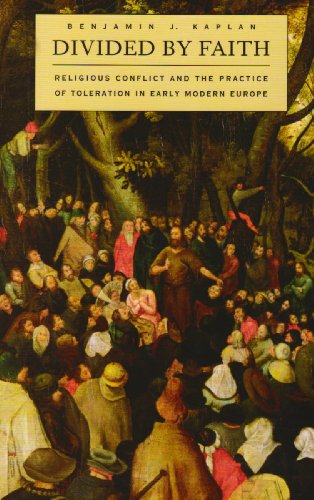Críticas:
Kaplan examines the sometimes lurid and always remarkable history of religious conflict and tolerance in Europe during the period between the Reformation and the French Revolution (from the 16th to the late 18th centuries). Conceding this is a thoroughly plowed field of inquiry and eschewing the establishment of new facts, Kaplan's detail-laden yet thoroughly accessible text acknowledges the roles of contemporary philosophers, theologians, and leaders (e.g., Oliver Cromwell, John Locke, and Voltaire) in quieting a continent contorted by religious conflict. Kaplan's major contribution, however, is to redirect the level of analysis to "peasants and craftsmen, women and minorities" who developed the ability to get along on a day-to-day, shoulder-to-shoulder basis despite religious toleration at the time often having been considered heresy in and of itself. -- James R. Kuhlman Library Journal 20071015 At this moment, there may be no more important story than the one Europeans and Americans proudly tell themselves about the rise of religious toleration. So please take note of Benjamin J. Kaplan's argument that the story may be dangerously flawed...Contrary to the once-popular notion that religious toleration rose steadily from the Middle Ages through the Protestant Reformation and on to the Enlightenment, Mr. Kaplan maintains that religious toleration declined from around 1550 to 1750...Divided by Faith ends with five words that sum up its message and could serve as a motto for historical studies generally: "the possibility of other options." -- Peter Steinfels New York Times 20071124 [A] splendid book...The book is worth a look merely for its fascinating vignettes of religious life in [Switzerland, the Low Countries, and the German principalities that made up the Holy Roman Empire]. One striking discovery is that there was more religious freedom in the 16th century than after the wars of religion ended a century later...It would be a long time before Europe's Christians rediscovered such a spirit of religious tolerance. That is something critics of today's Islamic world should remember, as should unquestioning believers in the virtue of the European Enlightenment. As well as its fine story-telling, Mr. Kaplan's book has the great merit of reinstating religion and quarrels about religious practice at the heart of the modern European history--where they clearly belong. The Economist 20071213 Kaplan creates a brilliant survey of that most fraught of religious eras, the Reformation and Counter-Reformation, and ranges with engaging humor and perception across Europe. -- Diarmaid MacCulloch Times Higher Education Supplement 20071214 Kaplan argues convincingly that the breakdown of the religious consensus made toleration less rather than more likely. Before the Reformation, some devotional diversity had existed under the Catholic umbrella, but from the late sixteenth century onwards, Christian denominations demonized one another in a desperate attempt to shore up their versions of religious truth: tensions were created where none had existed before...Kaplan demonstrates that religious violence continued well into the age of Enlightenment...His employment of facts on the ground is an effective way of countering myths about the early modern period, and his objection to the notion that "ideas have autonomous power, separate from the human beings who generate, transmit, accept, or reject them" is an appropriate response to previous studies of toleration which have lifted the ideas of Locke and Bayle out of their historical context. -- Eliane Glaser Times Literary Supplement 20080704 In this remarkable book, Kaplan challenges the generally accepted narrative that modern tolerance arose out of the crucible of the religious wars of the early modern period and triumphed during the Enlightenment as reason replaced religion's hold over people...This is a masterful synthesis, engagingly written and compellingly argued, that will appeal both to scholars and those concerned about current religious tensions. -- J. Harrie Choice 20080801
Reseña del editor:
As religious violence flares around the world, we are confronted with an acute dilemma: Can people coexist in peace when their basic beliefs are irreconcilable? Benjamin Kaplan responds by taking us back to early modern Europe, when the issue of religious toleration was no less pressing than it is today. Divided by Faith begins in the wake of the Protestant Reformation, when the unity of western Christendom was shattered, and takes us on a panoramic tour of Europe's religious landscape--and its deep fault lines--over the next three centuries. Kaplan's grand canvas reveals the patterns of conflict and toleration among Christians, Jews, and Muslims across the continent, from the British Isles to Poland. It lays bare the complex realities of day-to-day interactions and calls into question the received wisdom that toleration underwent an evolutionary rise as Europe grew more "enlightened." We are given vivid examples of the improvised arrangements that made peaceful coexistence possible, and shown how common folk contributed to toleration as significantly as did intellectuals and rulers. Bloodshed was prevented not by the high ideals of tolerance and individual rights upheld today, but by the pragmatism, charity, and social ties that continued to bind people divided by faith. Divided by Faith is both history from the bottom up and a much-needed challenge to our belief in the triumph of reason over faith. This compelling story reveals that toleration has taken many guises in the past and suggests that it may well do the same in the future.
„Über diesen Titel“ kann sich auf eine andere Ausgabe dieses Titels beziehen.


